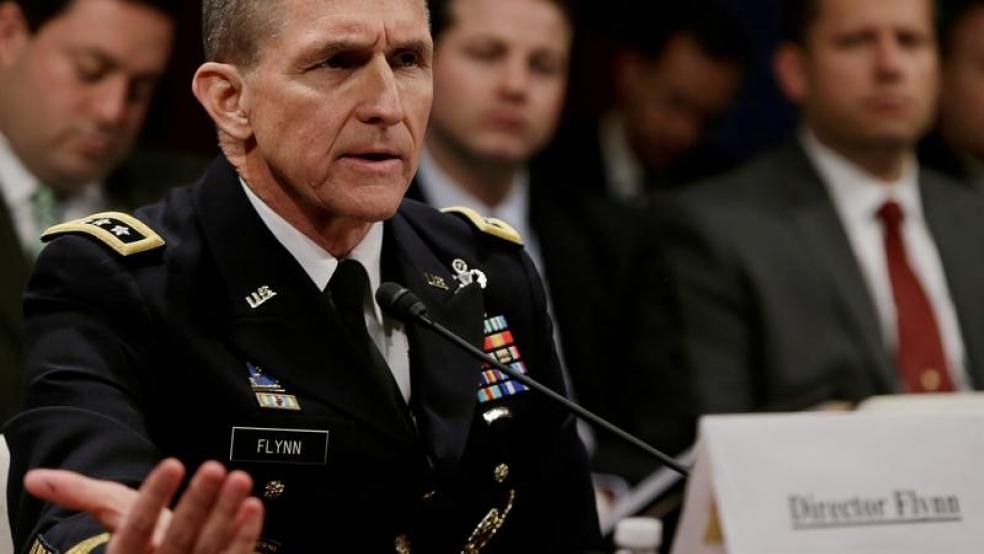On paper, Michael Flynn, the ex-Army general and campaign cheerleader chosen by Donald Trump to be his National Security Adviser, has top-notch credentials.
A career military officer, Flynn came up through the ranks the hard way: He began not with the pedigree of a West Point cadet but as a graduate of the ROTC program at the University of Rhode Island.
Related: Out Like Flynn: Why Trump Must Dump the ‘Fake News’ General
As chief of intelligence for Gen. Stanley McChrystal when he was running the war in Afghanistan, Flynn is said to have distinguished himself with an uncanny ability to unravel terrorist networks and has been called “one of the most respected military intelligence officers of his generation” by The Washington Post. Such a record no doubt contributed to his selection by former President Obama to head the Defense Intelligence Agency, one of the military’s major spy services.
The role of National Security Adviser has been in place since the beginning of the Cold War, and Flynn is by no means the first ex-officer to hold the critical post; former Lt. General Brent Scowcroft and former four-star Gen. and Chairman of the Joint Chiefs of Staff Colin Powell are among those who preceded him.
In fact, National Security Advisers have had a mixed-bag of qualifications, including careers as diplomats and academics. Notable examples are McGeorge Bundy, Walt Rostow, Henry Kissinger and Condoleezza Rice, all of whom became involved in disastrous military actions overseas.
However, perhaps no recent appointment to this role has been as controversial as Flynn’s, and it raises a question that begs to be answered, especially in light of the threats America faces and the fact that Trump, like the three presidents who came before him, has zero experience in foreign affairs: Why is one of the jobs most important to the safety of the nation not subject to Senate oversight?
Related: Day of the Generals: Trump’s Tilt Toward the Military
According to a Washington Post report last month, Flynn was investigated in 2010 when he was intelligence chief in Afghanistan for inappropriately sharing secrets with allies. But the more disturbing questions center on his activities and behavior after being ousted as head of the DIA, reportedly following clashes with other powerful spooks within the Obama administration.
The consulting firm he started, Flynn Intel Group, was a paid lobbyist for a Turkish businessman with ties to the government of President Recep Tayyip Erdoğan, according to The New York Times. And in an op-ed for The Hill on Nov. 8, Flynn identified the Pennsylvania-based mullah Fethullah Gülen, a fierce opponent of the Erdoğan regime, as a radical Islamist whose “vast global network has all the right markings to fit the description of a dangerous sleeper terror network.”
Given Flynn’s intel bona fides, those charges are not to be taken lightly. But it is the general’s hyperbolic tone, evident at Trump rallies where he led chants of “lock her up” directed at Hillary Clinton, that seems alarming in an adviser charged with giving clear-headed opinions to a commander-in-chief who isn’t known for keeping a cool head.
Beyond that, Flynn was a purveyor of fake news during Trump’s campaign and has recent history with Russia that is troubling: In 2015, he was a paid speaker for RT (formerly Russia Today) and attended an anniversary gala for the Kremlin-backed TV news network in Moscow, where he was seated at the right hand of President Vladimir Putin.
Related: Looks Like Flynn Is Manipulating Trump on Russia. Where’s His Pink Slip?
On Sunday, The Wall Street Journal reported that Flynn was being investigated by U.S. counterintelligence for calls to Russian officials around the time Obama was imposing sanctions on Moscow for hacking and interfering in the American election (including by using RT to disseminate anti-Clinton stories). However, on Monday night a Post story said the FBI had reviewed intercepted communications between Flynn and the Russian ambassador to the U.S. and found “no evidence of wrongdoing.” How all that shakes out remains to be seen.
But if the Flynn appointment has had one beneficial effect, it has been to put a spotlight on the job he now holds. The Senate must confirm the Secretaries of Defense and Homeland Security and the Director of the CIA. It even gets to grill the nominee for Commerce Secretary. So why not the National Security Adviser? Because that job has never has required advice and consent? Because it doesn’t control a major budget?
Gary Samore, executive director for research at the Belfer Center for Science and International Affairs at Harvard's Kennedy School of Government, offers another reason why Flynn or anyone else appointed to his position should not have to sit for a Senate grilling.
"In my experience, the Senate confirmation process is badly broken, with many lengthy delays or senators seeking to extract concessions in exchange for voting for nominees," said Samore, who served for four years as President Obama’s White House Coordinator for Arms Control and Weapons of Mass Destruction. "So I would not favor requiring Senate confirmation for the National Security Adviser."
You could also argue that there are numerous other advisers who have the president’s ear and won’t be vetted, some of whom may be highly influential. But given the checkered, life-and-death advice National Security Advisers have delivered in the past and given the clear-and-present dangers, shouldn't the nation have the right, through its elected representatives, to question the counselor whose views may directly affect its safety?
Will Flynn be the honest broker that the role demands? That’s hard to know if we don’t get to ask him.
This article was updated at 6:14 p.m. on Jan. 24.





